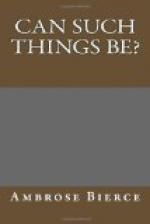My natural reply would have been that I drank it, but there was something about the query that suggested a hidden significance, and something about the man that did not invite a shallow jest. And so, having no other answer ready, I merely held my tongue, but felt as if I were resting under an imputation of guilt, and that my silence was being construed into a confession.
Just then a cold shadow fell upon my cheek, and caused me to look up. We were descending into my ravine! I cannot describe the sensation that came upon me: I had not seen it since it unbosomed itself four years before, and now I felt like one to whom a friend has made some sorrowing confession of crime long past, and who has basely deserted him in consequence. The old memories of Jo. Dunfer, his fragmentary revelation, and the unsatisfying explanatory note by the headstone, came back with singular distinctness. I wondered what had become of Jo., and—I turned sharply round and asked my prisoner. He was intently watching his cattle, and without withdrawing his eyes replied:
“Gee-up, old Terrapin! He lies aside of Ah Wee up the gulch. Like to see it? They always come back to the spot—I’ve been expectin’ you. H-woa!”
At the enunciation of the aspirate, Fuddy-Duddy, the incapable terrapin, came to a dead halt, and before the vowel had died away up the ravine had folded up all his eight legs and lain down in the dusty road, regardless of the effect upon his derned skin. The queer little man slid off his seat to the ground and started up the dell without deigning to look back to see if I was following. But I was.
It was about the same season of the year, and at near the same hour of the day, of my last visit. The jays clamored loudly, and the trees whispered darkly, as before; and I somehow traced in the two sounds a fanciful analogy to the open boastfulness of Mr. Jo. Dunfer’s mouth and the mysterious reticence of his manner, and to the mingled hardihood and tenderness of his sole literary production—the epitaph. All things in the valley seemed unchanged, excepting the cow-path, which was almost wholly overgrown with weeds. When we came out into the “clearing,” however, there was change enough. Among the stumps and trunks of the fallen saplings, those that had been hacked “China fashion” were no longer distinguishable from those that were cut “’Melican way.” It was as if the Old-World barbarism




